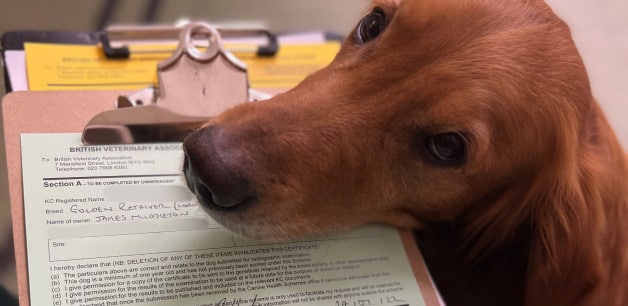The meaning of ethical breeding
As a pet parent and Kennel Club registered breeder, I’m passionate about spreading awareness on the importance of ethical breeding. I’m often surprised to find that many pet parents don’t always know what ethical breeding means.
Ethical breeding means more than prioritising the health and wellbeing of the parents and their puppies. It also surrounds the importance of breed preservation, ensuring the breed stays true to its origins, all whilst maintaining a moral code of ethics. Unethical breeding on the other hand, is the number one contributor to genetic defects in litters, and dogs ending up in shelters.
This blog will cover many aspects of ethical breeding. The health benefits of breed preservation, why I choose to maintain my pack’s lineages, and what red flags to look out for when searching for your new best friend. This topic is very close to my heart, which is why it’s important to me to help educate people on the importance of ethical breeding. Not just for today, but for the future too.

What is breed preservation and why is it important?
‘Breed preservation’ is a crucial part of breeding. It’s one of the reasons why pet parents, like myself, choose to ethically preserve the lineage of their dogs. By preserving breeds through ethical practices, we’re able to improve the breed as a whole. This is achieved by careful selection, enhancing the best traits and removing the undesirable ones.
Take the cocker spaniel for example. The name ‘cocker’, derived from their ability to hunt woodcock. Now, due to progressive breeding, cocker spaniels and their unique, enhanced sense of smell are a popular breed for service dogs, saving thousands of lives every year. In fact, ethical breeding has been a huge contributor to the evolution of several of today’s incredible working breeds! To learn more about the vital work that service dogs do every day, take a look at my blog: How service dogs save lives.
Another reason why breed preservation is important is because it helps to prevent the risk of breed endangerment. You might not be aware, but there are a total of 32 pedigree dog breeds in the UK that are considered vulnerable. Some of the breeds include the notorious working collie, the greyhound and field spaniel. If we fail to ethically preserve these dog breeds, then unfortunately many would be at risk of extinction.
Not only this, but some vulnerable breeds which might be a perfect match to somebody’s lifestyle, are often overlooked, simply because they’re not well known. Because of this, another breed may be chosen instead which might be unsuitable. Sadly, situations like this often result in dogs being surrendered to shelters due to their unsuitability. This is why it’s so important to preserve dog breeds via ethical breeding practices, especially those which are vulnerable.
Lastly, ethical and correct breeding helps to preserve the health of the breed, by removing faulty genes from lineages. This means breeders can reduce the risks of puppies inheriting genetic disorders. This in turn helps to reinforce the pedigree, instilling trust in puppy parents that their new best friend has been responsibly bred, with their health and wellbeing as the top priority.
Unfortunately, irresponsible breeders who breed for profit are the ones who let us all down, and ultimately give breeding a bad reputation.

The rescue vs breeder debate
I’m a proud advocate for the work rescue centres do, and I encourage anyone to rescue a dog if it’s the right fit for them. If you’re interested in adopting a rescue dog, you can learn more about the process in my blog: Adopting a rescue dog.
However, it’s important to recognise that not everyone is able to rescue a shelter dog, and as a pet parent of six working dogs, I can empathise with this. Because of this, there will always be a demand for puppies, and dog breeding will always occur.
There’s an ongoing debate about breeding vs adopting rescues. In fact, many rescue shelters are advocates for ethical breeding! The more care and attention that goes into a puppy’s genetics and health, the less chance it will end up in a shelter. It’s also in the best interests of the new owner to ensure that their puppy has come from a reputable, ethical breeder.
This is one of the reasons why I choose to breed. I’m proud to continue the line of my family dogs and to ensure the puppies are going to the right homes. Just as a rescue centre will do their due diligence to find the right home for a shelter dog, so will an ethical dog breeder. The priority lies with finding the right home for the puppy.
If breeding stopped completely, pedigree breeds would extinguish and we would lose our incredible working and service breeds. Instead, it’s my belief that we should improve breeding regulations and spread awareness of how to spot red flags. This way, people who are looking to buy a puppy can do so responsibly, which in turn would help to eradicate backyard breeders and puppy mills. Over time, fewer dogs would end up in shelters, freeing up more space in rescue centres and reducing unnecessary euthanasia.

What are the red flags of an unethical breeder?
Unfortunately, unethical breeding practices over time have resulted in the development of inherited health problems in dogs. Heart and respiratory issues, stunted growth and genetic disorders are sadly commonplace now in many breeds. Backyard breeders and puppy mills are the biggest contributor to thousands of unhealthy or ‘untrainable’ dogs ending up in shelters every year.
If you’re in the market for a new best friend, here are some of the easiest red flags to spot in an irresponsible breeder.
The breeder has not registered the litter with the Kennel Club.
The breeder won’t let you see the puppy without exchanging money first (if you find yourself transferring a “holding deposit” before performing a home visit, be wary!).
The breeder is unable to provide any information on genetic testing.
The mother (or littermates) are not around when you collect your puppy.
You’re unable to view the pen or kennel where the puppies were raised.
The breeder has little to no questions for you regarding your home environment or the life you can offer your new puppy.
With these red flags in mind, keep wary when purchasing a puppy, particularly from social media. If you’re after more advice on finding a new dog to join your family, you can read my blog, ‘My guide to getting a new dog’.

“Happiness is a healthy puppy!”
Thank you so much for taking the time to read this blog! Ethical breeding is a topic that’s very close to my heart. I feel honoured to be able to preserve the family lineage of my pack, and Mabel is no exception – her great grandmother, Tilly, was my first family dog.
It’s important to remember that breeding will always happen. But if we can educate more owners, then maybe fewer puppies will be bought from puppy mills and backyard breeders.
The health and wellbeing of my dogs is always my number one priority when it comes to breeding. If you’re looking for help or advice, or if you’d simply like to discuss anything mentioned in this blog, please feel free to reach out to me at james@ella.co. I would love to hear your thoughts!
James & Ella x
